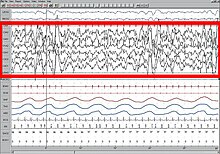Agrypnia excitata
| Classification according to ICD-10 | |
|---|---|
| G47 | sleep disorders |
| G47.0 | Difficulty falling asleep and staying asleep |
| F10.4 | Mental and behavioral disorders due to alcohol |
| ICD-10 online (WHO version 2019) | |
Agrypnia (Greek for insomnia ) excitata (Latin for excited) is a term from sleep research . It is used as a generic term for diseases in which the affected patients do not experience stages 3 and 4 of non-REM sleep . In particular, these include fatal familial insomnia , Morvan syndrome and delirium tremens . Typically, abnormal REM sleep occurs in all cases .
The reasons for the lack of levels 3 and 4 of non-REM sleep are different:
- In the case of fatal familial insomnia , an imbalance between activation and deactivation of structures in the limbic system is caused by atrophy of the mediodorsal and anteroventral thalamic nuclei .
- In Morvan syndrome and delirium tremens , a functional imbalance in the control loops between the thalamus and the limbic system is blamed. The cause here is assumed to be the direct effect of alcohol with long-term consumption or the formation of antibodies.

Normal EEG in stages of NREM sleep affected by Agrypnia Excitata . The delta waves outlined in red then do not occur.
In medical theory, the concept of Agrypnia Excitata ultimately also leads to the fact that not 2 but 3 independent sleep phases can be assumed.
Individual evidence
- ↑ a b E. Lugaresi: Agrypnia excitata: clinical features and pathophysiological implications . In: Sleep Medicine Reviews . 5/4, pp. 313–322 here online
- ↑ a b P. Montagna: Agrypnia Excitata: a generalized overactivity syndrome and a useful concept in the neurophysiopathology of sleep. In: Clinical Neurophysiology . 113/4, p. 552. online here